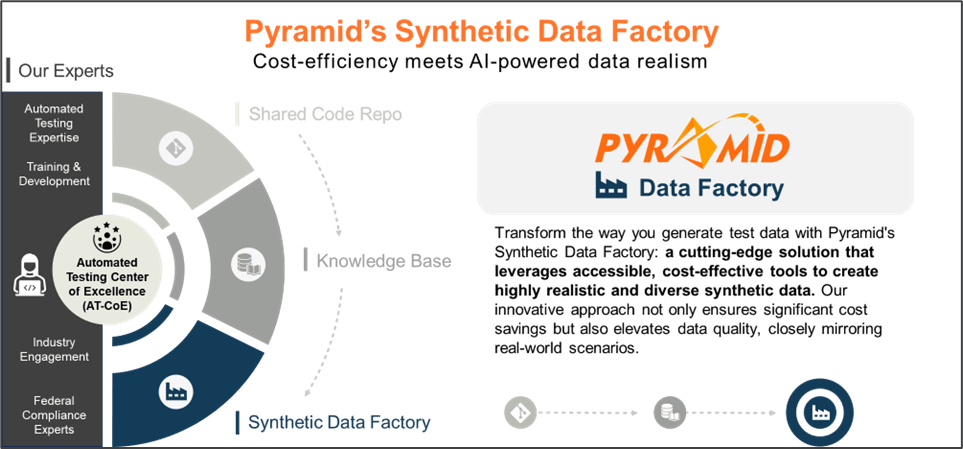By: Owen Erhahon
Discover the pitfalls of traditional test data creation and the risks they pose. Explore how synthetic data, powered by AI, offers a solution to these challenges. Unlock the secrets of Pyramid Systems’ Synthetic Data Factory—a game-changer in achieving optimal software quality and faster delivery times.
Traditional Approaches to Test Data Creation Are Flawed
DevOps best practices advocate for three key environments in application development: Development, Test, and Production. The Production environment encompasses the actual services utilized by your mission. DevOps engineers are tasked with testing, validating, and promoting code from Development to Test to Production. It’s essential for engineers to utilize Production-quality data in the Development environment to accurately capture sequencing issues and edge cases.
The practice of copying Production data to Development and Test environments raises significant privacy concerns, inviting breaches and necessitating extensive security oversight and compliance investment. This common practice has prompted numerous articles on protecting Production data in Test environments, often offering similar advice.
- Protect your credentials and access;
- Mask and sanitize the data before it’s loaded;
- Better yet, don’t use Production data in Test environments at all!
However, few provide insight on how to avoid using Production data. I’m here to tell you it’s possible, and you can do it with technology you’re likely already using.
The Ripple Effect of Inadequate Test Data
Commonly recommended practices for transferring Production Data into Development environments include copying (duplicating), masking (hiding sensitive data), and subsetting (reducing data). These methods for protecting sensitive information typically require manual oversight. Leaders cannot rely solely on engineers’ judgment to identify and safeguard all relevant data.
These traditional, flawed practices utilized by development teams have led to significant issues. Poor testing data directly correlates with poor software quality, often resulting in diminished user satisfaction or, worse, abandonment. If your users are dissatisfied with the software you’re providing, it’s crucial to consider whether crummy test data may be the root cause.
Inadequate or incomplete Development data fails to cover all conditions encountered in Production. This often results in premature promotion to the Test and Production environments, leading to costly and time-consuming bug fixes. The absence of quality test data further delays the delivery of tangible value, resulting in significant setbacks to project timelines.
The Synthetic Data Solution
This is where synthetic data steps in. Synthetic data emerges as a solution, leveraging AI-driven models to generate rich, diverse, and realistic datasets free from the constraints of traditional methods. It provides developers with access to high-quality, relevant test data that closely mirrors real-world scenarios.
However, approach synthetic data with caution.
The reproducibility of sensitive information from synthetic datasets, particularly in federal government contexts, is a genuine concern. It must be demonstrable, with mathematical certainty, that synthetic data cannot be reverse-engineered to replicate Production data. Mathematical models provided by academia and data-centric private entities offer means to measure data de-identification risk.
Moreover, synthetic approaches must adhere to sensitive data protection standards and produce datasets that capture the nuanced nature of Production data. This includes addressing “rare events,” removing bias, and preserving intricate insights and relationships present in the original data. Whether your Production data is complex or straightforward, synthetic data should accurately replicate its nuances.
Our Solution Accelerator: The Synthetic Data Factory
Pyramid Systems helps agencies overcome the challenges of inadequate test data. We provide our Synthetic Data Factory openly to our App Dev clients at no additional cost. With our approach, you will experience a reduction in time-to-value delivery vs. the expected or current outcomes. Our approach uses common and non-proprietary technology (in this case, Python + compute power), and our experts lean on the collective knowledge of our Automated Testing Center of Excellence community to learn from the past and make innovation real in the now.



